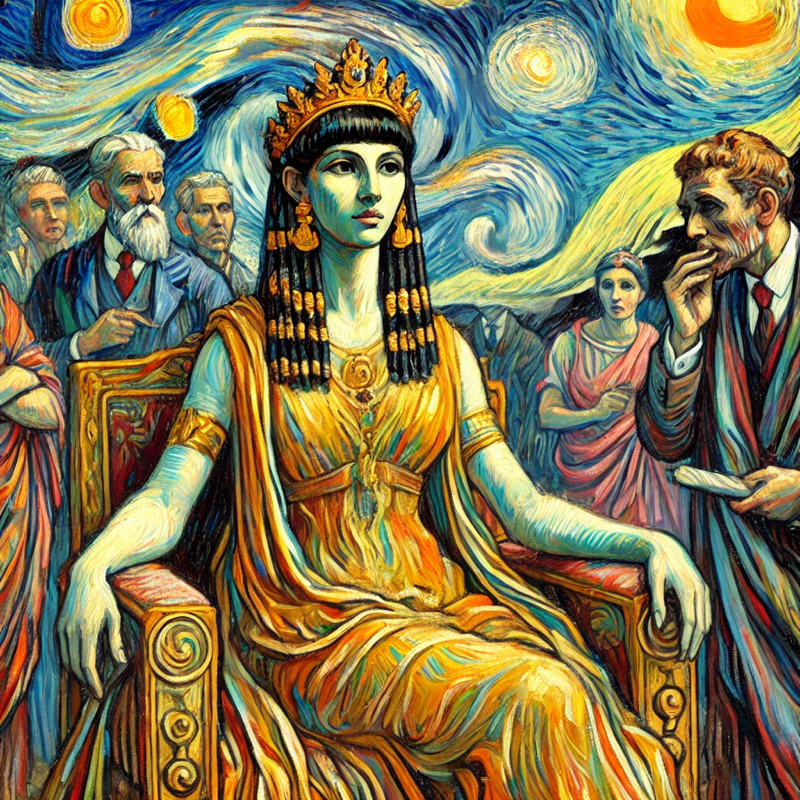Cleopatra: The Stigma of Power, Gender, and Legacy

Introduction
Cleopatra VII Philopator, the last active ruler of the Ptolemaic Kingdom of Egypt, remains one of the most enigmatic figures in history. Known for her intelligence, political acumen, and legendary beauty, Cleopatra’s life has been shaped as much by historical narratives as by myth. While she was a shrewd leader who skillfully maneuvered through the volatile world of Roman politics, she also faced an immense amount of stigma—both in her own lifetime and posthumously. These biases, rooted in gender, foreignness, and power, affected her legacy profoundly. By examining the nature of the stigma she faced, how she responded to it, and the lessons we can draw from her experiences, we gain insights not just into ancient history but also into the dynamics of prejudice that persist in society today.
The Stigma Cleopatra Faced
Cleopatra’s reputation has been shaped largely by the Roman sources that survived her, and these narratives were often filled with contempt, misogyny, and xenophobia. The three primary forms of stigma she faced were:
- Gender Bias: In a male-dominated world, Cleopatra’s intelligence and influence were often downplayed or reinterpreted as mere seduction. Roman historians, particularly those aligned with her enemies, depicted her not as a capable monarch but as a temptress who manipulated powerful men like Julius Caesar and Mark Antony. This characterization diminished her genuine political strategies and diplomatic prowess.
- Foreignness and Orientalism: Cleopatra was seen as an outsider by the Romans, who viewed Egypt as an exotic and decadent land. As a Greek-descended ruler of an Egyptian kingdom, she straddled multiple identities, but to the Romans, she represented the antithesis of their values. Her association with luxury and mysticism contributed to her portrayal as a dangerous foreign queen corrupting noble Roman men.
- Association with Defeat: Cleopatra’s alliance with Mark Antony put her in direct opposition to Octavian (later Augustus), the eventual ruler of Rome. The victorious Romans needed to justify their conquest, and portraying Cleopatra as a reckless, manipulative, and destructive force served their narrative well. Her tragic end—suicide following her and Antony’s defeat—cemented her image as a fallen, doomed figure rather than a competent ruler.
How Cleopatra Handled the Stigma
Despite the immense challenges posed by these stigmas, Cleopatra displayed remarkable resilience and strategic brilliance in confronting them.
- Reframing the Narrative: Cleopatra did not attempt to conform to Roman ideals; instead, she leaned into her Egyptian identity. She portrayed herself as the reincarnation of the goddess Isis, emphasizing divine legitimacy and continuity. This allowed her to command loyalty among her people while differentiating herself from Roman rulers.
- Diplomatic Alliances: Understanding the power dynamics of her time, Cleopatra forged relationships with key Roman leaders, including Julius Caesar and Mark Antony. These alliances were not just romantic; they were strategic moves to secure Egypt’s sovereignty and her own political standing.
- Cultural and Economic Strength: Cleopatra focused on Egypt’s prosperity, investing in trade, infrastructure, and the economy. By strengthening Egypt internally, she ensured that her kingdom remained a significant player in the Mediterranean world, countering narratives that painted her as merely dependent on Rome.
- A Calculated Defiance: Even in death, Cleopatra controlled her own narrative. Rather than being paraded as a defeated enemy in Octavian’s triumph, she chose to take her life, thus preserving her dignity and denying her enemies the satisfaction of displaying her as a trophy.
Lessons We Can Learn
- Stigma is often a reflection of power dynamics: Much of the prejudice Cleopatra faced stemmed from those who sought to undermine her authority. Understanding this helps us recognize how bias operates in modern contexts.
- Reclaiming identity is a powerful tool: Instead of conforming to the expectations of dominant narratives, Cleopatra embraced and redefined her identity. This lesson is particularly relevant in today’s discussions on cultural and personal identity.
- Perception can be shaped by those in power: History is often written by victors. The way Cleopatra was portrayed by her enemies influenced how she was remembered for centuries. Being aware of who controls the narratives in our own time helps in questioning biases.
- Resilience in the face of stigma matters: Cleopatra’s life was full of challenges, but she navigated them with intelligence and strategy. Facing stigma with confidence and calculated action remains a key lesson for anyone dealing with bias today.
Conclusion
Cleopatra was far more than the seductive queen of popular imagination. She was a brilliant strategist, a shrewd diplomat, and a leader who defied the immense stigma imposed upon her by a patriarchal and imperialistic world. Though she ultimately could not prevent the fall of her kingdom, her ability to navigate political and societal biases with grace and intelligence offers enduring lessons on power, resilience, and the nature of historical narrative. By studying her life, we not only gain a deeper understanding of the past but also equip ourselves with insights into the challenges of the present.
